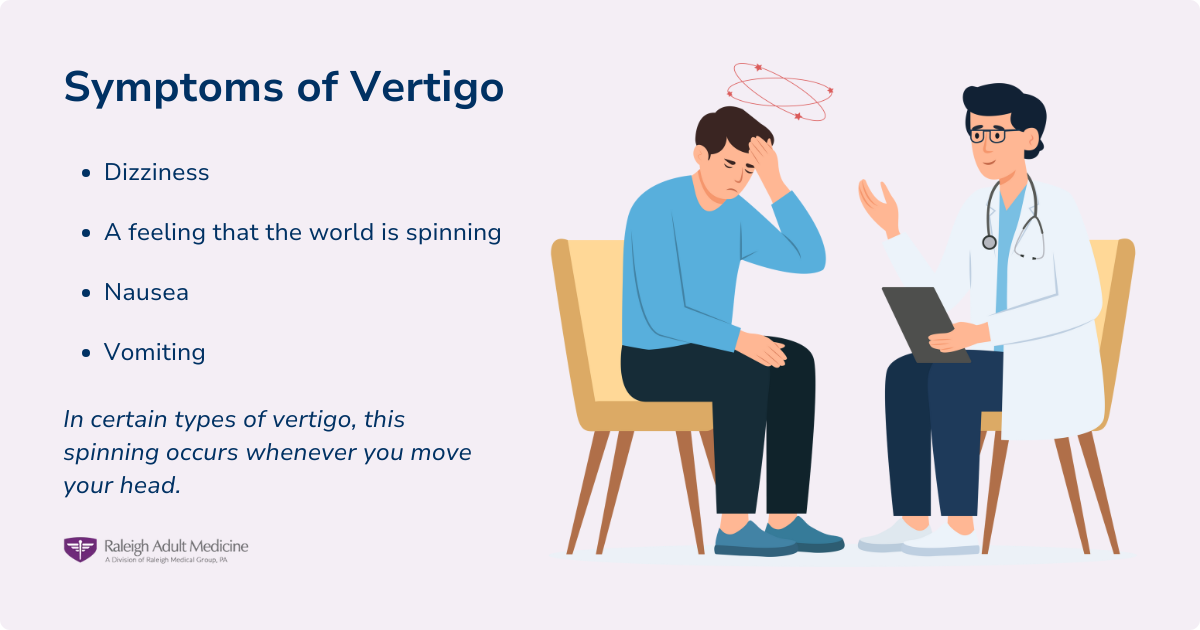7 Cures for Vertigo and Motion Sickness
Does the prospect of a road trip make you uneasy? Do twisted rural roads cause your stomach to lurch? Are you adamant to make sure you’re always the one driving or riding “shotgun?”
Motion sickness and vertigo can make anyone miserable. Certain people seem prone to these conditions, and we’ll take a detailed look at the causes behind them and how our internal medicine physicians can help you.
What’s The Difference Between Vertigo and Motion Sickness?
Vertigo is a specific type of dizziness that comes from problems deep within the inner ear. Vertigo can occur regardless of whether or not you’re in a moving vehicle or on a plane. In fact, vertigo can occur even if you’re lying down.
Motion sickness frequently occurs in response to either your motion or the motion in the environment.
Many of the reasons behind vertigo and motion sickness center on what’s happening in the inner ear. We’ll review its role in balance, the difference between vertigo and motion sickness, and what you can do about it.
What Is Vertigo?
Vertigo gives a severe, false sense of spinning. It’s usually centered on problems with the fluid in the inner ear, which plays a vital role in balance. It usually comes in short bursts lasting for several seconds.

Do You Get Nauseous With Vertigo?
Yes, it’s not at all unusual to get nauseous with vertigo.
What Causes Vertigo?
Sometimes there is no cause. Other times it centers on carbonite crystals in the inner ear that have become dislodged (we’ll explain in more detail when we talk about the inner ear at the end of this article).
We do know that vertigo is more common in the elderly, and it can even be seen after major or mild head trauma. Ménière’s disease and labyrinthitis (an inner ear infection) are also common causes.
What Causes Dizziness and Motion Sickness?
We don’t have to explain what motion sickness is—you may have undoubtedly experienced it either riding in a car or on an amusement park ride. But the causes of dizziness and motion sickness are more nuanced.
First, let’s separate these two conditions.
Dizziness can have several different causes. It’s a symptom and not a disease in itself. If you’re experiencing dizziness, we’re in a unique position to help you as internal medicine doctors in Raleigh.
We’re able to look at your overall health and determine which of your body’s systems are influencing others. This is one of the things that separates internal medicine physicians in Raleigh from other physicians. We look at how these systems interact with the understanding that one disorder can have a “domino” effect on the others.
While motion sickness can cause dizziness, every case of dizziness isn’t due to motion sickness.
Motion sickness occurs when your brain can’t separate conflicting information. This happens when there’s a disconnect between what you see, what you feel, and what your muscles are experiencing.
Consider this example:
You’re flying when the plane goes through turbulence. While your muscles feel the movement and the balance organs in your ear detect a shift, your eye can’t see what is causing the motion. In many cases—especially if you are in an aisle seat—your eyes may not see anything “moving” at all.
These conflicting messages cause the nausea found in motion sickness.
The Inner Ear and Its Role in Balance
To fully understand the far-reaching effects of vertigo and motion sickness, we have to take a closer look at the inner ear, which is considered the balance center of the body.
In your inner ear are several tiny, fluid-filled canals. They also have hair-like sensors that let your body know if you’re standing upright or where the body is in relation to your center of gravity.
At the base of these canals, sensory cells can help you distinguish between motions such as up and down (if you’re in an elevator or an airplane) or forward and backward. They also tell your body if you’re upright or lying down.
These sensors relay their messages to the brain, which can then enable the body to change direction to balance itself or make a different direction in motion.
7 Cures for Vertigo and Motion Sickness
Can You Take Motion Sickness Pills for Vertigo?
For certain types of vertigo, motion sickness pills may help. However, for other types—such as Benign Paroxysmal Positional Vertigo (BPPV)—motion sickness pills will not address the underlying issue, and may even delay your recovery.
What Is the Treatment for Motion Sickness and Vertigo?
We evaluate each individual case and recognize that there is no one treatment that is effective for everyone. However, in general, the following can be effective to help those with motion sickness or vertigo.
1. Repositioning
BPPV vertigo can be treated through “repositioning.” This procedure, often done in your doctor’s office, involves placing you in a position that induces vertigo, then turning you carefully into another position.
This change allows fluid and crystals in your inner ear to realign. This treatment has a good success rate.
2. Medications
There are several different medications to treat motion sickness. Contact your medical provider who will explain the benefits of each one and make a recommendation based upon your individualized needs.
Use caution when giving medication to children. Speak with their pediatrician first.
3. Determine Where You Sit
This can be a useful preventative technique when combating motion sickness. Wherever you decide to travel, make sure that you can see some type of motion. By ship that may mean getting a cabin near the water level, while on a plane, it may mean a seat over the front edge of a wing.
Opting to drive or sitting in the upfront passenger seat can help.
The goal is to give your eyes a chance to relay the message of motion to your brain, so that the “signals” between your muscles, eyes and inner ear balance without conflict.
Keep your focus, too. Try to look at the horizon and keep your head still.
If at all possible, avoid sitting around smokers.
4. Consider Ginger
Ginger supplements or even ginger ale can help combat nausea that accompanies motion sickness.
5. Eat Lightly
Avoid having a large meal before traveling. You might want to have some plain crackers to nibble on to help settle your stomach. Carbonated drinks—without caffeine—are also a good idea. Don’t drink alcohol.
6. Acupressure
While research into alternative therapies is ongoing, there is some evidence that a small amount of pressure on your wrist can alleviate nausea. However, other studies have shown mixed results.
7. Fresh Air
If you feel motion sickness coming on, roll down a window or, if possible, go outdoors. Alternatively, you may wish to turn air vents toward you. Essentially, blowing cool air on your face or around your forehead may provide some relief.
Chronic Motion Sickness? Contact Us for An Appointment
Fortunately, most cases of motion sickness can be easily alleviated. However, if you’re having extensive trouble with nausea that resists treatment , it may be a symptom of another condition.
For more than 20 years, we’ve served the Raleigh area as the leading internal medicine doctors in the Triangle area. Contact us for solutions to your motion sickness and vertigo problems.




